|
AN EXCLUSIVE INTERVIEW WITH
NEAL SMITH |
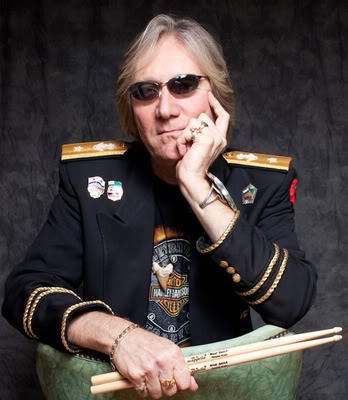 This exclusive interview with Neal was done a couple of months ago following the release of the ďBillion Dollar BabiesĒ Super-Audio CD release. (See
www.audiofidelity.net)
This exclusive interview with Neal was done a couple of months ago following the release of the ďBillion Dollar BabiesĒ Super-Audio CD release. (See
www.audiofidelity.net)
In this conversation we managed to discuss the Billion Dollar Babies era, including all the albumís tracks. We also touched on the follow up album ďMuscle Of LoveĒ, and various other topics, including James Bond, AC alumni, and Nealís upcoming third Killsmith project.
Find out more on Nealís current projects and to order stuff from him, check out
www.nealsmithrocks.com
Thanks to Neal for his time [apologies this took so long].
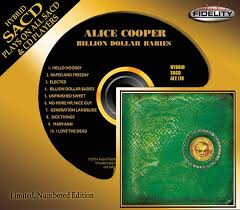 What do you think of the sound, any differences on the Super-audio release?
What do you think of the sound, any differences on the Super-audio release?
Well, I think it sounds great. Itís a great system. Whether there's that much difference over a normal CD... I understand the technology, and Iíve listened to it and it sounds a bit better; those songs still sound great over time, as far as I'm concerned.
When you guys were producing that album, did you have any kind of indication that it was going to be something big?
Well, we knew... Love It to Death and Killer had done very well, each album had continued to climb higher on the charts, and each album sold more, and we were just trying to do a strong follow up to Schools Out. And by this time the money was rolling in, and the shows were getting bigger. But, like always we were either in the studio recording, or on the road touring or we were writing music in our home, in Connecticut. So we were always doing something. And the songs sounded great; you know Michael wrote the majority of the music to the songs, and they sounded fantastic. Everybody in the band was writing at the time. And I think it was just a good flow from schools out to this album. A little different feel because Schools Out was more the Alice Cooper 'gang', ya know, and now the dream had really come true for us, and from what we had talked about on the Love It To Death album on the song Still Got A Long Way To Go and Caught In A Dream, about projecting where we were going to be if we were able to find success, and we had become successful, so we were basically talking about ourselves on that album.
B$Bs has a lot of credits - various engineers, 3 guitarists that weren't in the band, a few guests. How big of a deal was it, and did you think it may be a bit too much at the time?
Well, the reason there was so many people is because we recorded it at our home in Greenwich, Connecticut; the mansion that we had. We all lived together, under the same roof. It had a huge ballroom, and that's where we recorded some of the tracks. We also had a rehearsal studio that we recorded in, too - in the house. Then we recorded at the Record Plant in New York, then we recorded some at Morgan Studio in London. So it was engineers in there from New York, Connecticut, and London.
Glen, unfortunately, had succumbed to some of the demons of rock n roll at the time. He was just not able to really do what he had done on the Schools Out album - which I still call his album. So we had to bring in some other guitar players, to help us. Michael Bruce played pretty much all the rhythm tracks, and some of the leads, but then we brought in Dick Wagner - who'd done a couple of tracks, and Steve Hunter - I think, a couple of tracks as well; as far as the lead guitar. So we did have that help.
What we wanted to accomplish also was the sound that we got on the albums, we wanted to be able to duplicate that on the stage. So for us to bring a keyboard player, because Michael would always go back and forth between keyboard and guitar, and of course - when he played one or the other that would leave kind of a hole in the music. I think, the 4 of us - Glen Buxton on guitar, myself on drums, Dennis on bass, and Michael on either guitar or keyboard - could more than cover the music, but when you start writing songs more and recording more you just want to duplicate what you do in the studio occasionally , so that's why on the Billion Dollar Babies tour we had to bring Bob Dolin on the keyboards with us on the road, and another guitar player - Mick Mashbir, who was a friend of mine from Camelback High School in Phoenix, Arizona. So, he came on board with us, and he and Glen were good buddies, and Mike was a great guitar player - still is.
I interviewed him last year.
Great. He's a really good guy, and we've known each other since the '60s, when we went to school together.
So, it was just different. We had the ability to do it, and we wanted, we were just taking it to the next level. It was still theatrical - 100% Alice Cooper with songs like Sick Things, I Love The Dead - it had the real macabre songs, and then it had the songs like No More Mr. Nice Guy, Hello Hooray and Elected that were more upbeat.
Do you remember any particular tracks that Glen was a part of?
The only thing that I recall he did on that was on Sick Things, there's that guitar solo on it, and the guitar is actually smashed - and that was the only thing he did on that album.
And Mick Mashbir played on it?
Yeah, Mike played on it, as well, and then came on the road with us, as well. He and Mike Bruce became really good friends.
One thing with this album and with most of the albums - there's the intros, and there's so much going on from song to song. Hello Hooray has that showtune type of quality, you have that big intro to Billion Dollar Babies, and in Unfinished Sweet you have that bass & drum thing going on in like a James Bond theme thing...
Bands don't do that anymore, and you guys didn't repeat anything...
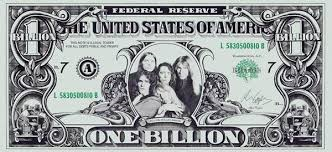 We liked making every song have it's own signature. Even though the theme of the 5 of us playing together - Alice's vocals, his lyrics, my drumming, Dennis' bass playing, us as a rhythm section, Glen's crazy guitar playing - when he was at the top of his game, Michael's songwriting, and then Bob Ezrin putting it all on tape in the studio for us; that was the formula - no matter what the song was, whether it was Billion Dollar Babies with the drum intro, or Black Ju Ju with the drum intro, or Sick Things with the monstrous bass guitar intro, or No More Mr. Nice Guy with a guitar riff. So, we loved songs like that. I've always liked songs that there was something special about them when they start. I think it just adds to the character, kind of a signature to the song. Not every single song that we did was like that; I'm 18 kinda just started out of nowhere with the "bah bah..." [Sings intro]. But we always liked to feature everybody in the band. It was a band 100%, everybody pulled their weight; everybody was certainly capable of - like the beginning of Schools Out, that was his intro and he played it every single time, and as many times as we played that song he wrote the intro, he played it, it was his signature, my signature is the Billion Dollar Babies intro.
We liked making every song have it's own signature. Even though the theme of the 5 of us playing together - Alice's vocals, his lyrics, my drumming, Dennis' bass playing, us as a rhythm section, Glen's crazy guitar playing - when he was at the top of his game, Michael's songwriting, and then Bob Ezrin putting it all on tape in the studio for us; that was the formula - no matter what the song was, whether it was Billion Dollar Babies with the drum intro, or Black Ju Ju with the drum intro, or Sick Things with the monstrous bass guitar intro, or No More Mr. Nice Guy with a guitar riff. So, we loved songs like that. I've always liked songs that there was something special about them when they start. I think it just adds to the character, kind of a signature to the song. Not every single song that we did was like that; I'm 18 kinda just started out of nowhere with the "bah bah..." [Sings intro]. But we always liked to feature everybody in the band. It was a band 100%, everybody pulled their weight; everybody was certainly capable of - like the beginning of Schools Out, that was his intro and he played it every single time, and as many times as we played that song he wrote the intro, he played it, it was his signature, my signature is the Billion Dollar Babies intro.
I want to talk about the songs... Hello Hooray was written by a Canadian, which you guys picked up. Was the intention that you were looking for an intro song or did somebody just bring it in?
Rolf Kempf. Of all the albums we recorded, there were only a couple of other songs written by somebody else. And that song was presented to us. I still have the reel to reel tape with the original song on it; I guess Judy Collins did a version of it just before we did, so. We didn't normally do someone else's material because we were such avid writers, ourselves, but for the beginning of the album, Billion Dollar Babies, and for the beginning of the Billion Dollar Babies show it seemed to be perfect! It was a great track; Bob liked it, so we played it and learned it, and it sounded great. It was a perfect intro to our show. It really said what the band was all about, and what we had done and what we had accomplished. And the lyrics were all written by him, and I think Alice, stood aside as a lyricist, (and Alice is a great lyricist) and went with the lyrics that were wrote, and it worked perfect. So, it opened the show. And on the album, as the song fades out - there's cannons that are firing, very very subtle in the background, so I wanted to make a point of listening to that on the new CD. I would've loved to have had cannons on stage, but AC/DC got around to doing that years later.
Raped And Freezin is another one I really like, and it could've been a single too, but the title may have been a bit borderline!?
I think everything that we did was borderline! And that's the amazing thing about why a band like us made it and got in to the Rock N Roll Hall of Fame. It's because we were able to do what we did, and take a song like Raped And Freezin and then we'd have a song like No More Mr. Nice Guy - on the same album; and that would still be 100% Alice Cooper, but it was more acceptable for the majority of the people buying the singles and listening to the radio at the time, or would actually play it (I should say).
And I like it. It's a neat song; it's got the maracas in there, and lyrically it sounds like Alice is the victim in the song...
Yeah, I guess. He gets picked up by somebody while he's hitchhiking, and of course it has a southwestern, kind of a Mexican flair in the music - which I always loved to bring a different feel in to the music, as far as the percussion went. And of course we were from Phoenix, Arizona, so from Desperado on Killer to Raped And Freezin on Billion Dollar Babies, so once in a while some of the things in the areas from where we lived in different parts of the country would filter in to our music.
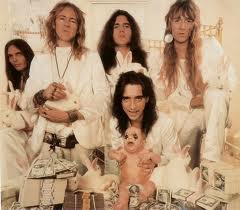 Elected was done before the rest of the album, so I guess there was no question whether it would go on the album or not!?
Elected was done before the rest of the album, so I guess there was no question whether it would go on the album or not!?
Elected was done for the elections of 1972. And obviously that was recorded and released before the album (which was just the 'next' album). So from the standpoint of 'did it have anything to do with some sort of concept?', it was a song that we'd already recorded so we put it on the album.
And it obviously harked back to Reflected from the first album.
Exactly, Yeah. In fact, Reflected's original title was Elected! And we changed it to Reflected for Pretties For You, and then we brought it back out, dusted it off, rearranged it, and changed the feel a little bit, but it still had a lot of the characteristics of the original song, and then changed the name to Elected. And after Schools Out, which was a timely song - with the ending of the school year, and then the election was coming and we wanted something timely, because we'd found kind of a formula with that - first with I'm 18, to Schools Out, now Elected... So that is why we chose to use that subject; it was working for us, and nobody else was really doing it to that intensity that we were.
On the song Billion Dollar Babies, do you remember where that whole drum-roll intro came from?
First of all, the song... Rockin Reggie was a friend of our's, used to hang out with the band; he was from Detroit originally. We would party with him a lot, and when we moved to Connecticut he would come and hang out with us. He was a good friend of Glen's, and he was a guitar player and a singer, with kind of a Nashville influence. And he had a song, and it eventually evolved in to the song Billion Dollar Babies. So that is why he (Reginald Vincent) has a writing credit on Billion Dollar Babies. So, we worked on it at our mansion house, in Greenwich, and I had always loved the Rolling Stones intro from Charlie Watts to the song '[Hey You] Get Off Of My Cloud'. I thought that was very cool, and as a drummer I always used to like to write songs for drummers, because people listen to songs and think 'that's cool', but if I was a drummer listening to an Alice Cooper song - what would be cool about it? And I always tried to have something special in there that would get someone's interest. So this one gave me the opportunity. And I'm a rudimental [sp?] drummer; I learned all the rudiments when I was first trained, early in my music education. And I always loved flams; Mississippi Queen and there was some other great songs had a big flam all the way through. And You Drive Me Nervous, from Killer, was flams all the way through the song. For people that don't know what they are, it's like a double stroke, you use both sticks with one syncopated just right after the other on a single stroke, and it sounds like 2 hits at almost the same time. Itís one of the basic rudiments of percussion. So I wanted to have a drum intro, and we were fooling around ya know - with songs that would feature different guys in the band in the beginning to the intros to a particular song. And pretty much had liberty to do whatever I wanted to a song, and Bob Ezrin heard the song being a little bit straighter played all the way through the song, but I liked the idea of this flam intro and then sort of keep it going through the song. And Bob said "well, ya know if you're going to play it you have to play it perfect!" And I did play it perfect and it ended up being the intro to the song as well, and gave it a certain flashy character and feature to it that I think helped it stand alone. Billion Dollar Babies is such an interesting song and interesting album.
That's got to be one of the most recognizable drum intros out there, in the history of rock.
Yeah, there's not a lot of them, but there's some cool ones. But Iím very very happy always been read proud of the fact that, again, I was able to work with a group that we just influenced each other and let our imaginations go crazy and come up with some stuff. Alice's bands over the years, you know - he's worked with some phenomenal musicians and songwriters, but the thing is we did have that flare and it worked great.
Unfinished Sweet is one you had a credit on, and that instrumental part in the song is a big part of it for me. Was it influenced by a show tune or movie theme, like a James Bond type of thing?
Yeah, exactly! We were all big fans of the monster movies, and James Bond, and West Side Story, so all of those things came in to inspire our music throughout the years. When Iíd written the song original, and Mike Bruce and I started working it out, and he came up with some elaborations on the music and some arrangements. My original lyrics on the song were totally re-written by Alice, and he went in another direction. And we did the same thing on the song "Alma Mater" from Schools Out; I had written the song and I got total credit on that song, but Alice did have something to do with the lyrics that were in the song. On this song, the idea of going to the dentist scares people and it was about going under and while you're under and having your teeth worked on, you're having this dream and it becomes like a James Bond story. So that's how that happened. And Bob Ezrin's the perfect person to work on with that. And I love John Barry. John Barry's the composer who wrote all the great James Bond songs in the movies and the great music, so that certainly inspired us on that song. And of course, on stage the Amazing Randy came out with the giant drill like you see in the movie "Good To See You Again, Alice Cooper", and he takes this monstrous drill and puts it on Alice's mouth and you hear the sound of the drill noises on the record, and that was on stage as well. And to this day when I listen to that drill sound, it makes me cringe a little bit. But it turned out to be a great song, and it was a great song on stage too.
No More Mr. Nice Guy, a straight ahead rock song...
Yeah, a straight ahead rock song that Michael originally wrote; he wrote the name of the song and then Alice [again] did his thing to the lyrics, and took it in a real Alice Cooper group direction. It was just a great riff; very memorable, great hook, and again - another fun song to play and just be totally creative with. It was one of those songs that went 'boom' from beginning to end; it has some nice changes in it, and that intro - that's as noticeable to me as Billion Dollar Babies; and Michael came up with that part. It was a great album to put together and record.
Generation Landslide, that's very different, with the acoustic guitar....
That was the last song that we wrote on the album. We were on tour over in Europe and we were stationed out of London. We were staying at the Brinks Hotel. We needed one more song for the album, and we wanted to get away because we'd been in London for a while; we toured throughout Europe. So this right before the holidays, November - December of 1972, and we came up with the idea, somebody suggested going to the Canary Islands, and writing our last song. And since pretty much anything we wanted to do we could do at that time, we got our roadies, took some equipment with us, took some drums, guitars and amps, and went down to the Canary island. There was a brand new hotel in the town, and I don't even remember the name of it or which city it was in, but that's where we went. And it was a new hotel, and the top 2 floors were suites that weren't finished yet; they were still putting the rooms together, but there was power up there and all the walls and windows were there, so we'd just go up there any time of day or night that we wanted to and play, and it didn't bother anybody because it was so far away from everyone. We were there for about 5 days and it was great. It was a fun place to hang out; we walked in the open streets, and lots of things from Africa were there, drums, and I was in Heaven. So the reason we were there was to write this song, so we were up in these rooms and we were kind of having writer's block, you know - we weren't coming up with anything. So Michael didn't have any ideas, and Dennis, Glen and I tried to brainstorm and come up with some stuff, but nothing was going on. So Michael said to me "play a beat", so I just started going [sings beat], and Michael started strumming some chords, and in 15 minutes we wrote the song. And I love Alice's harmonica playing; he's a great harmonica player, he should play it more, but he doesn't. He played on "18", and he'd done it on a couple of tracks, but I don't think he did any on Killer or Schools Out. so on the guitar solo, we were hugely influenced and knew a lot of Yardbirds' songs, so the break in the song was inspired by The Yardbirds and the solos that they would have, where they'd go "bom bom", then they'd stop and the harmonica would play in - it was like an old blues thing, which is really what it is. And we'd never tried anything like that as Alice Cooper, even though we knew those songs for years. so that's where that song came from. And lyrically, I think my 2 favorite songs to listen to are "My Stars" and Generation Landslide. And it was such a great song to play drums on too; it was a cool song for me to play on - just let the kit run right through there. And once we had the idea, the direction - the song was written really fast.
And the end of the album has the twisted stuff with Sick Things and I Love The Dead.
Yeah, now Sick Things - that's right down the alley that I love! My solo project "KillSmith" -- that's the real macabre; that's the real dark side of Alice Cooper, which I love. Sick Things was just such a great song for us to lead in to I Love The Dead, where of course we'd cut Alice's head off with the guillotine. And I still have the same guillotine to this day. Sick Things was just talking about necrophilia, tearing people apart and having sex with dead people. So believe me we were still pissing the parents off talking about these sorts of things, and people were buying the records by the millions. But again, it's what we loved to do, we loved to shock people. I don't think you could do it anymore, but back then that was a big deal to talk about that sort of thing. And we were always politically incorrect, and I still am to this day - if somebody can't take a joke - to heck with them! As far as Iím concerned it was purely for fun and entertainment, just like going to the movies.
And I Love The Dead was a great song. It had, sort of an old rock n roll hook from the 50s, which we were all inspired by growing up. But Bob Ezrin was really influential in producing those 2 songs.
Sick Things had the orchestration going on, and heavy drums...
That was one of the songs that we recorded at our mansion in Greenwich. There was a huge ballroom where we would actually rehearse our live shows. And the fireplace was so big you could put a small car in there, and there was like 40 foot ceilings. We'd bring all the equipment up and do our full rehearsals right there, before we would go on tour across the United States, Canada, South America, and Europe, or wherever. That's where we would rehearse everything, but we would also use that room. we'd made a drum riser about ten feet high, put the drums up there, and then put microphones all around this big monstrous room and that was the drum sound we got for Sick Things. I'm just banging [sings drum intro] and the thing just echoed through there, and just big rolls across tom-toms in that room, it was just monstrous. There was just no way could you get a bigger sound than that... maybe in the Grand Canyon or something!
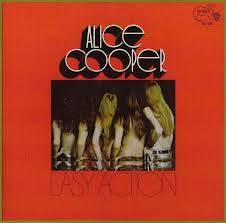 And you guys also had the inclusion of Mary-Ann, which was an odd piano ballad.
And you guys also had the inclusion of Mary-Ann, which was an odd piano ballad.
Yeah, on the Easy Action album, there was a song Michael wrote called Beautiful Flyaway that was very 'Broadway', very theatrical, and so we thought that with everything we had on the Billion Dollar Babies album - Sick Things, I Love The Dead, Raped & Freezin', something a little lighter, but it had to have - as far as the dynamics of the whole album goes, it had to have that Alice Cooper twist on it; so if you listen to the lyrics you certainly know what the twist is on that. But again, that goes in to the theatrics of what Alice Cooper was and what we could do musically, theatrically, as well as what was on stage.
Now back in those days, did you guys do extra songs that were edited out?
You mean extra songs that never made it on the records!?
Yeah, usually you would do 40 minutes of music, but would there be more to pick from?
We had other takes of same songs, but when we recorded an album - we recorded 9 or 10 songs and that would be all the songs. There wouldn't be any extra songs.
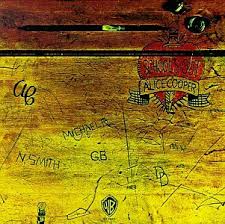 What was the highlight of this era -- when it dawned on you guys how big this was: you had the 4 singles, a number 1 album, and a huge tour...
What was the highlight of this era -- when it dawned on you guys how big this was: you had the 4 singles, a number 1 album, and a huge tour...
The highlight of course, to me - because we had had gold albums, we had platinum albums, we were all making tons of money, and living the dream of being rock stars. I had the Rolls Royce and the Bentley, and we were living the dream - living the life! But I never expected, even though Schools Out went to #2 on Billboard, I never anticipated or expected in my life that our band, because I know the social and political ramifications of what we were doing - the fans loved us, but the music establishment at the time never recognized the band; so just because of pure sales and the air-play we were getting at that time, it drove Billion Dollar Babies in April of 1973 to the #1 album in the world - Cashbox, Record World, and Billboard magazine. So, that was unbelievable. And it was kind of like 'what the hell are we going to do after this?í you know!? I think everybody was hoping just to have a successful album after the success of Schools Out, but I think it was a great album; it wasn't just a follow-up album. And I think it stood the test of time and the songs still sound great.
Do you remember a moment out of the road when it dawned on you guys? Was there a group reaction?
My biggest moment was when I bought my first Rolls Royce. You know, as soon as I had the money because I remember from the beginning, when I started playing drums I always wanted a Rolls Royce. And by the time Killer came around, and then Schools Out - I had no problem buying one. After I'm 18 hit we were playing big venues, and then after Killer and Schools Out - we were headlining every show for the next 2 -3 years. We were doing what we wanted to do. We took the year off, Alice didn't want to get back together with the original band he wanted to continue on his solo stuff - which was not our agreement, our agreement was we were all going to do a solo album then get back together, but it was one of those things where 'if we're going to go out - we're going to go out on top', and we did.
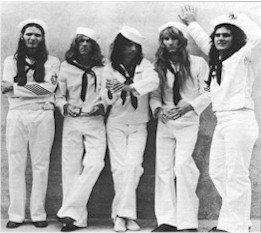 With Muscle Of Love, did you have any expectations of how that album would be received after Billion Dollar Babies?
With Muscle Of Love, did you have any expectations of how that album would be received after Billion Dollar Babies?
Well, Bob Ezrin, unfortunately did not get to work with us on that album. I love a lot of songs on that album; it has some great songs on it. It shipped a million copies, and I think 800 00 sold, and they had to ship some of them back. But also it was because of the packaging; they weren't expecting this funny box. There were a lot of people that sent them back because they thought there was a stain on the box - well that was intentional, but some people were too freakin' stupid to understand that. So, there were some logistical problems with it that had never occurred before. But I thought the album was great. You know, I would've loved to work with Bob on it, but we worked with Jack Richardson and Jack Douglas - 2 really good friends, and 2 great producers. I never thought anything wrong with the album; I still love it to this day. Muscle Of Love is one of my favorite songs also, it's a great song! I'm crankin' out double bass drums on that song all the way through, and it's got nice changes...
There's a lot of different stuff on that album...
Yeah, there were different things. The only thing I didn't really like on that album was "Crazy Little Child"; I thought that - for us, was a little bit out of the norm. Even though for my solo stuff I've recorded songs like that, I think for the Alice Cooper group - I just never really saw where that fit with us. I think with Mary-Ann, I understood how that worked, but something that was that different!?... It was a cool song in its own way, but I think if it had been replaced with another song it could've changed the color and the character of that whole album.
Big Apple Dreamin?
Well, of course music was changing at the time. And I don't think anyone in the band wanted it to be a disco band, but a song like Big Apple Dreamin, there was a place called The Hippo in New York, a discothŤque, in the early to mid 70s. It was actually called The Hippopotamus, so Hippo - it was also called that naturally. We would go there and hang out when we were in New York, because we lived in Connecticut, and where we lived at the time was only about a half hour drive in to the city. So we would hang out there a lot, be in there a lot on the odd days. And we thought it'd be a goof to have a song; it's not with a disco beat, but it's like The Stones when they did Miss You, just sort of a nod to the music scene that was going on at the time. It was an experiment for us, and I think it's kind of a cool song. And again, an experimental song for us - we weren't that kind of band. But we were always willing to listen to stuff. Lyrically, it was interesting - that's for sure. But we did try different things on that album.
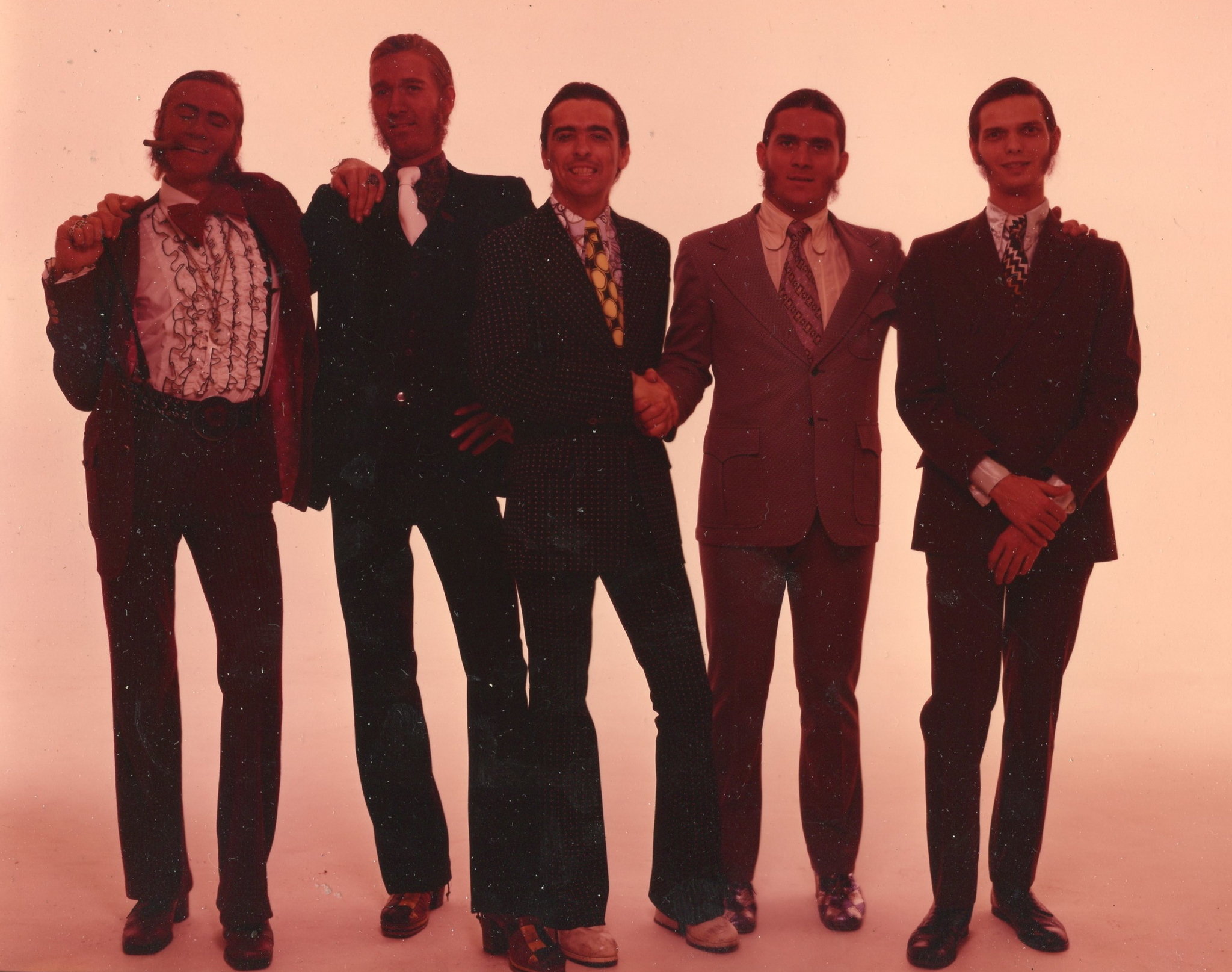 I love the riff to Never Been Sold Before, a classic riff. And Woman Machine's another one I love.
I love the riff to Never Been Sold Before, a classic riff. And Woman Machine's another one I love.
Woman Machine's great because of all the percussion. That was a fun song to do. Again, experimenting with different percussion.
And you used outside guitar players on that album [again] with Mick, Steve Hunter, and Dick Wagner!?
Mick Mashbir, he helped a lot with that record, and there may have been a couple of licks here and there that Steve Hunter and Dick Wagner played on - I can't recall right now, because they always didnít get credits on the album, but I think they may have played some stuff on that.
Now Glen, I take it, didn't play on the album!?
No, Glen didn't play a thing on Muscle Of Love, but he did come up with the title though! we were in Seattle or Vancouver, on the west coast, and we were driving to a show in the back of a limo talking about something and Glen was laying on the floor [he'd been drinking a little bit, ha-ha] and Iím sitting there with my feet over him, and we were talking about somebody and he says "ahh, he can kiss my muscle of love!" So we thought that was a pretty cool title for an album.
One thing that is interesting is he gets a number of co-writing credits on that album.
Yes again, because if we were working on a song - as a band; you know like Generation Landslide - if we all sat down and write a song together as opposed to if I have an idea and I bring it and Alice and Mike get involved with it. or if Dennis brings in a song, like Black Ju Ju or Dead Babies or something, then the people who get involved in it get a credit, but if a song just sort of evolves with the whole band it would be all 5 of our names on the credit.
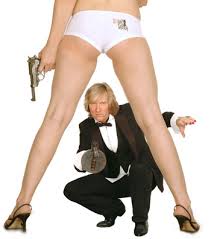 Man With The Golden Gun -- How James Bond influenced was that?
Man With The Golden Gun -- How James Bond influenced was that?
Well, that was the new movie that was coming out and every time a new movie would come out they would have somebody that was a very popular singer who would do the theme song. And of course, nobody would ever have Alice Cooper do a theme song to a James Bond movie! Just we just said 'what the hell!' - the next movie coming out was going to be called The Man With The Golden Gun, so we knew that was coming and we wrote a song about it and we just put it on the album. And it would be a long shot that they would actually use it in the movie, although we didn't think that would ever happen; but I think the biggest slap in the face was that Lu [of all people] ended up singing the theme song. We lost out to Lu Lu. [ha-ha]. That was a low-blow to us.
So, did you actually submit it or anything?
Well, it was just there. Believe me, if anyone was looking for anything there, they knew it was out. So everybody knew it. Whether it was officially submitted, I canít tell you that. But it was out well before the movie, so they had plenty of time to have it, but I don't know if there was a real full-court press to get it done. Because we just knew the ramifications of a band like us... it'd be like the Rolling Stones or the Doors doing a theme song for a James Bond movie - not impossible, but not very likely.
Well, Paul McCartney did get on one.
Well you know what [?] - First of all, it's a great song, and it's perfect for Live And Let Die, and secondly, I think he probably worked very closely with John Barry on the song, which makes a big difference. If we had John Barry in the studio with us, it may have been a politically brilliant move on our part, or business move on our part. But it didn't happen.
Do you have a favorite James Bond movie or a favorite James Bond [actor]?
To me James Bond is Sean Connery, without a doubt! He was James Bond when I was growing up. All the movies are fun to watch, and Pierce Brosnan, he was pretty good. And even though they're great movies, there's no one that seems to be as James Bond-ish as Sean Connery. and even though the early movies probably are probably a little lackluster compared to the newer movies, Sean Connery is just unbeatable, in my opinion. And again, what made those movies so fantastic was his acting and John Barry's music. I think the best soundtrack ever is Goldfinger, hands down, without a doubt! Itís one of the best soundtrack albums to any movie, ever! You take that music away from the movie and its 'ok', but it's phenomenal with that music.
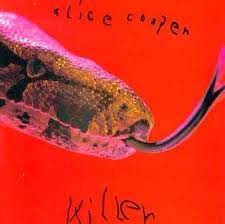 Regarding the cover for B$Bs. How did the whole concept come about with the snakeskin? And how involved would you guys have been in that sort of stuff?
Regarding the cover for B$Bs. How did the whole concept come about with the snakeskin? And how involved would you guys have been in that sort of stuff?
Well, the snake - that is my pet snake on the cover of the Killer album, that's Katchina. And we started using her on the Love It To Death album, on Is It My Body, because when you're on the road - if you want to eat - you've gotta work! So we had this song Is It My Body, and it lended itself to kind of a stripper, kind of a saucy kind of element, so we rationed the stripper - Alice Cooper and the snake. So Katchina went to work, and we, of course, got a lot of popularity because of the snake. And she's probably the most famous snake in rock n roll.
So after Killer, we had Schools Out, and there wasn't really any indication of the snake on School Out, so ... it was Pacific Eye & Ear who designed that album cover for us. And what they would do was they would hear about the album concept or album title and give us specific ideas. so the idea of a wallet was a little lackluster when I first heard it, but then they showed us the design - with the pictures inside and the billion dollar bill, and that it was going to be made out of green snakeskin, and then it had the logo - the billion dollar baby with the make-up on and everything, then it started to make sense. It was a perfect album cover for that. I mean, of course - the panties were a real Alice Cooper thing, and then you know, they were banned because the original shipment of panties weren't flame retardant or something!? Ha-ha. It was like the chicken in Toronto, it was one of those stories that just got legs of its own, and we just said 'ok, just run with it' - whatever.
That's one of those things that made the albums back in the day was the amount of effort that went in to the packaging.
And that's one of the things I miss with CDs or just downloading. An element to the music when I was a kid was you wanted to get the album so you could look at it, ya know 'here's the band, and here's some pictures.' You can see pictures of anybody on the internet. It was very very special; it was very personalized at the time. And as a matter of fact I'm thinking of having on my new Killsmith CD, have the packaging the actual size of a real album with a couple of pages inside, with the story and the concept of the album and everything. And then slip the CD inside. I donít want to do it on vinyl, but there is something special about having that big package in your hand.
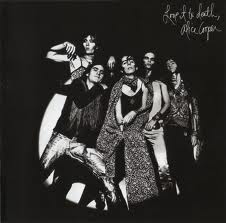 Well, I liked all those album covers. They were all classic covers.
Well, I liked all those album covers. They were all classic covers.
Yeah, the Alice Cooper album covers, there was always something very special about them.
Have you had any contact with any alumni over the years like Bob Dolin, Mick Mashbir...?
I really haven't talked to them in a while. I saw Mick, probably about 10 years ago at Alice restaurant "Cooperstown", in Phoenix, and we had played there on a couple of different occasions - when it was opened, and then on Glen Buxton memorial weekends.
Bob Dolin or Mike Marconi?
Mike Marconi, Dennis talks to him occasionally. He saw him up in the Rochester area, maybe a year or so ago. I saw some photos of him, he looked pretty much the same as he used to, except for he's got silver-ish hair. Mike's a great guy; he's one of the nicest guys in the world.
I saw him just outside of Buffalo and there's an interview with him at my site. We talked about the Battle Axe album...
He did a great job on that album, that's for sure. I was just disappointed it didn't do better than it did... but that's another story for another time.
You brought him into the fold?
Yeah, Mike played with me on The Platinum God album; it was Mike Marconi, Dennis, and myself that played on that album. Dennis did some great some stuff and was great to help me with it, and Marconi did some very cool lead, then we brought him in on the Battle Axe project.
What are you to now - you have a new Killsmith album coming out?
Yeah. My first Killsmith album I released was in about 2006, that was Sexual Savior. At the time in the late '90s and early 2000s I was experiencing a lot of the European heavy metal, that they weren't the biggest bands in the world, but they were amazing bands; one of them is Rammstein from Germany. I started listening to them, and some of the music Iím currently writing I could do in a similar feeling. So I wrote the album Killsmith Sexual Savior, and it came out great; I was trying to get some of that shock value of the Alice Cooper group. Lyrically, whatever - I can have a pretty foul mouth when I want to, and I donít want anything to censor my thoughts or what I wanted to write or say on the album. So it's pretty much - if you're under 18, you probably shouldn't listen to it without doing so secretly...
The next one was called Killsmith 2, that was a couple of years ago, 2011 - 2012. That was a little more radio friendly, but still very heavy metal, maybe a little more commercial from the standpoint of a couple of the hooks on some the songs. I have a song from Killsmith 2 on YouTube called Squeeze Like A Python. The video on YouTube came out great and we got a great response to it.
So, the newest one became a concept - Killsmith is a person, like a mixture of like, I would say between James Bond and Rambo. He's ex-military, and that's all Iím really going to say. Itís Killsmith and the Green Fire Empire. And the Green Fire Empire is a big drug cartel from a warm climate in the southern hemisphere. and it's a story of the reaction of him and this drug lord who invents a brand new drug that basically, hooks the world, and he [Killsmith] has to stop it on his own...or try to. So it's got almost, like a movie theme to it. All the songs have to do with the topic of the album. And just being heavy metal from the beginning to the end - this time I have a little more dynamics in the music. Nothing as drastic as Mary-Ann, but there's a couple of big rock ballads, and I even have a Christmas song in there! and because I sing everything, I create the character through the music, but I also have 3 other vocalists Peter Catucci, who is really my right-hand man in Killsmith - bass player and drummer, but I play all the rhythm guitars on the album, and a lot of keyboards, But I bring in really good musicians to play the really intricate synthesizers and guitar solos, that sort of thing; it even has some saxophone in there. And there's a couple of surprises here and there.
Going back to the last album, you had 2000 Miles From Detroit, another nod to Detroit.
Absolutely. Detroit's always in our hearts; It was Detroit and the Midwest that broke the band. Before we even brought Bob Ezrin in we were surviving by selling a few albums on Frank Zappa's label, and having a part of the country that really 'got' what we were doing, and enjoyed it. At the time The Stooges and the MC5 were big bands in Detroit; we moved in - we came in from out west, and we set up camp there, and we started playing all of the top places and playing all of the big festivals. And I asked a couple of people in the area - why do you guys like us so much?' [Just out of curiosity, because most people don't care], you know - 'you have some great bands here with the MC5 and The Stooges', and they said 'Well, you're doing what they're doing, but you're doing so much more!' And to me, I understood what they were saying. And the Alice Cooper fanbase was established right between Detroit, Cleveland, and Toronto - that was our launching grounds!
There was an interview on Toronto's Q107 about a year and a half ago with Bob, and in talking about the Alice Cooper stuff, one story he told was that he was basically sent out to see you guys because he was the youngest guy from the company and his initial instruction was to get rid of you guys.
Thatís right! Jack Richardson thought we were just a bunch of transvestites, drug taking, beer drinking weirdoes from California! And we wanted Nimbus 9 - Jack Richardson's company, to produce us, because we had done 2 albums that artistically [Pretties For You and Easy Action] we were happy with, but financially and commercially -- we didn't have a gold album, that's for sure! So, we wanted somebody that was doing hit records, and who was doing hit records in the late '60s [?] but The Guess Who. They just kept having hit record after hit record, and we were like 'who is producing these records?í so we found out it was Jack Richardson of Nimbus 9, up in Toronto. So we did a big press to get him to come and see us live, and we were playing at Max's Kansas City in New York, and it was just a showcase for somebody from the record company to come on down and check us out. and I know in the story you're talking about Jack wanted to get us off his tail, because we wrote so many times "Jack, will you come and see us"..."No" , ..."Jack, will you come and see us"... "No"! We asked him tons of times and he didn't want to come and see us. And our managers Shep Gordon and Joe Greenberg were in his office every day up in Canada. They went up there specifically to pressure him, well 'convince' him [let's put it that way] to seeing the band. So he said "fine. I have this new guy Bob Ezrin, I'll send him down." and he's thinking to himself that Bob Ezrin is classically trained, he's a technician, there's nothing about this weirdo group that he's going to like, and he's going to see them and go running back to Toronto with his tail between his legs. That's the story Jack Richardson told us! So Bob comes down to see us at Max's Kansas City - and he loves the band! And he gets it! And he goes back to Jack, and he says to Jack "there's a new huge wave of music coming, and this band is the tip of it, and either we get on board with it or it's going to pass us by." So, Bob Ezrin was the first one that really really got it, and loved the band, and from then on it was just about getting together and recording some hit records. and believe me, it all worked out, and there's always luck involved in it and there's timing, but we had all the components to make it work , and Bob Ezrin was the last component for us.
Still have contact with him?
Yeah, he had moved back to the lower Connecticut area a couple of years ago, and as a matter of fact I helped him find a house. Weíre in touch every couple of months, and when we were all together for the Hall Of Fame, he was with us. He was at the table with us, at the Waldorf Astoria in New York. And when we did the recording for Alice's second Nightmare album [Welcome 2 My Nightmare] he was in the studio with all of us, and you know - whenever we're together Bob's always there with us.
Dare I ask if there's anything going on as far as you guys ever playing again?
I think after the Hall Of Fame, a lot of people thought that we might do a couple of special shows around the country, but it really never happened, and it's up to Alice. You know - Michael is ready to do it, Dennis is ready to do it, I'm ready to do it, Steve Hunter played with us at the Hall Of Fame and the couple of shows we did in Arizona and in Los Angeles, so we could easily find a guitar player, and he's got some great guitar players playing with him now. But, for whatever reason, I mean - Alice is locked in to his music, he's got a great band, and that's what he's doing now. If you get in to the Rock N Roll Hall Of Fame and you don't do any shows after that I don't know what it takes, know what Iím saying!? We're kind of at that stage of our lives where we'd be willing to do something; and I don't think a full world tour is going to happen, by any sense of imagination, but to do a couple of highlighted shows like Detroit, Toronto, New York, Los Angeles, Phoenix, London ...that would totally be possible. But, the band was sounding great when we did the last couple of shows in LA, after 3 or 4 months we were sounding really tight.
Reviews:
© Kevin J. Julie (Universal Wheels) March 2014
 This exclusive interview with Neal was done a couple of months ago following the release of the ďBillion Dollar BabiesĒ Super-Audio CD release. (See
www.audiofidelity.net)
This exclusive interview with Neal was done a couple of months ago following the release of the ďBillion Dollar BabiesĒ Super-Audio CD release. (See
www.audiofidelity.net)  What do you think of the sound, any differences on the Super-audio release?
What do you think of the sound, any differences on the Super-audio release?  We liked making every song have it's own signature. Even though the theme of the 5 of us playing together - Alice's vocals, his lyrics, my drumming, Dennis' bass playing, us as a rhythm section, Glen's crazy guitar playing - when he was at the top of his game, Michael's songwriting, and then Bob Ezrin putting it all on tape in the studio for us; that was the formula - no matter what the song was, whether it was Billion Dollar Babies with the drum intro, or Black Ju Ju with the drum intro, or Sick Things with the monstrous bass guitar intro, or No More Mr. Nice Guy with a guitar riff. So, we loved songs like that. I've always liked songs that there was something special about them when they start. I think it just adds to the character, kind of a signature to the song. Not every single song that we did was like that; I'm 18 kinda just started out of nowhere with the "bah bah..." [Sings intro]. But we always liked to feature everybody in the band. It was a band 100%, everybody pulled their weight; everybody was certainly capable of - like the beginning of Schools Out, that was his intro and he played it every single time, and as many times as we played that song he wrote the intro, he played it, it was his signature, my signature is the Billion Dollar Babies intro.
We liked making every song have it's own signature. Even though the theme of the 5 of us playing together - Alice's vocals, his lyrics, my drumming, Dennis' bass playing, us as a rhythm section, Glen's crazy guitar playing - when he was at the top of his game, Michael's songwriting, and then Bob Ezrin putting it all on tape in the studio for us; that was the formula - no matter what the song was, whether it was Billion Dollar Babies with the drum intro, or Black Ju Ju with the drum intro, or Sick Things with the monstrous bass guitar intro, or No More Mr. Nice Guy with a guitar riff. So, we loved songs like that. I've always liked songs that there was something special about them when they start. I think it just adds to the character, kind of a signature to the song. Not every single song that we did was like that; I'm 18 kinda just started out of nowhere with the "bah bah..." [Sings intro]. But we always liked to feature everybody in the band. It was a band 100%, everybody pulled their weight; everybody was certainly capable of - like the beginning of Schools Out, that was his intro and he played it every single time, and as many times as we played that song he wrote the intro, he played it, it was his signature, my signature is the Billion Dollar Babies intro.  Elected was done before the rest of the album, so I guess there was no question whether it would go on the album or not!?
Elected was done before the rest of the album, so I guess there was no question whether it would go on the album or not!?  And you guys also had the inclusion of Mary-Ann, which was an odd piano ballad.
And you guys also had the inclusion of Mary-Ann, which was an odd piano ballad.  What was the highlight of this era -- when it dawned on you guys how big this was: you had the 4 singles, a number 1 album, and a huge tour...
What was the highlight of this era -- when it dawned on you guys how big this was: you had the 4 singles, a number 1 album, and a huge tour... With Muscle Of Love, did you have any expectations of how that album would be received after Billion Dollar Babies?
With Muscle Of Love, did you have any expectations of how that album would be received after Billion Dollar Babies?  I love the riff to Never Been Sold Before, a classic riff. And Woman Machine's another one I love.
I love the riff to Never Been Sold Before, a classic riff. And Woman Machine's another one I love.  Man With The Golden Gun -- How James Bond influenced was that?
Man With The Golden Gun -- How James Bond influenced was that?  Regarding the cover for B$Bs. How did the whole concept come about with the snakeskin? And how involved would you guys have been in that sort of stuff?
Regarding the cover for B$Bs. How did the whole concept come about with the snakeskin? And how involved would you guys have been in that sort of stuff?  Well, I liked all those album covers. They were all classic covers.
Well, I liked all those album covers. They were all classic covers.